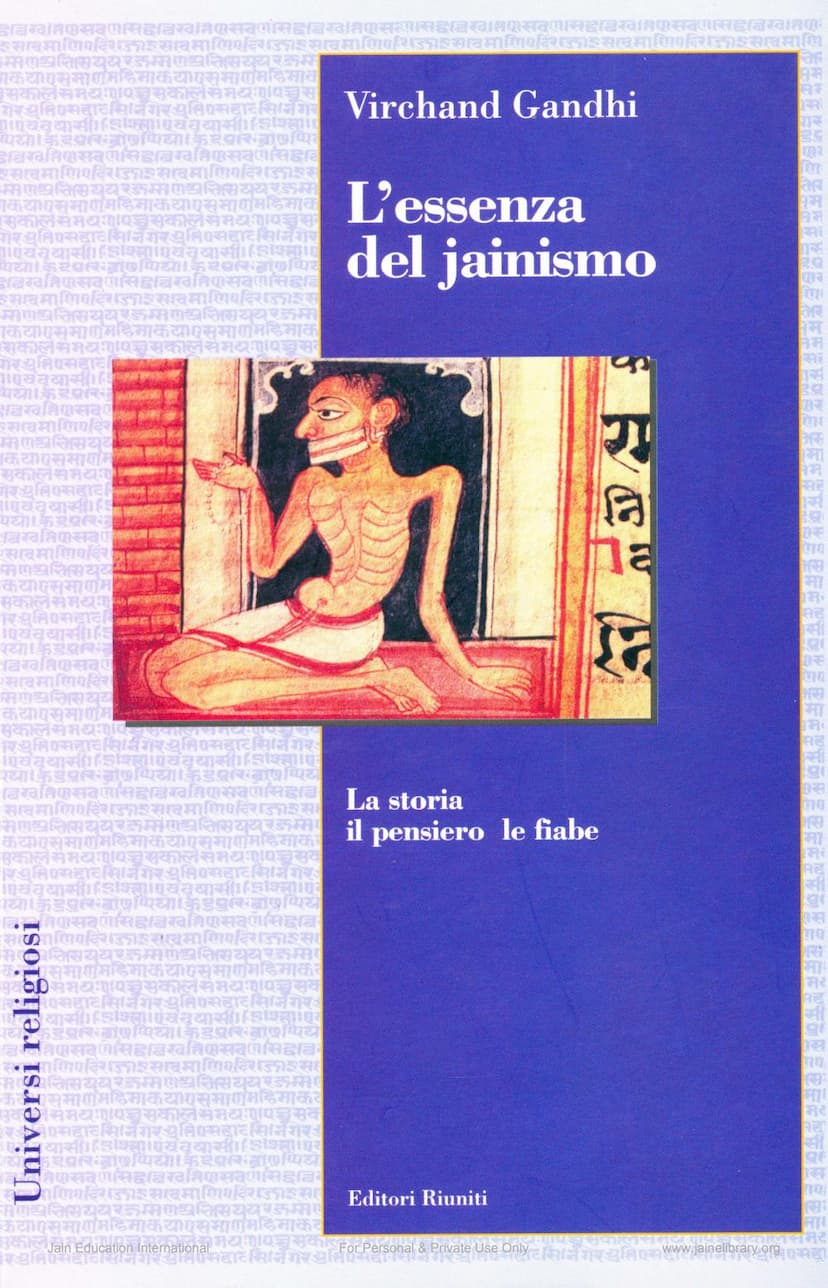Lessenza Del Jainismo
Added to library: September 2, 2025

Summary
Here's a comprehensive summary of "L'essenza del Jainismo" by Virchand Gandhi, edited by Claudia Pastorino and Massimo Tettamanti, based on the provided text:
Overview:
"L'essenza del Jainismo" (The Essence of Jainism) is a foundational text that explores the history, philosophy, and cultural context of Jainism. It presents the teachings of Virchand Gandhi, a prominent Jain scholar and advocate who played a crucial role in introducing Jainism to the Western world, particularly through his participation in the Parliament of World Religions in Chicago in 1893. The book aims to provide a comprehensive understanding of Jainism for a broader audience, highlighting its unique ethical principles and philosophical depth.
Key Themes and Concepts:
- Jainism as a "Secular Religion" or "Religion of the Godless": The text emphasizes that Jainism does not require belief in a creator God. Instead, it focuses on ethical conduct and personal effort for spiritual liberation. Even followers of other religions can be considered Jains if they adhere to its principles of right conduct.
- The Centrality of Ahimsa (Non-Violence): Ahimsa is presented as the cornerstone of Jainism. It is a principle that extends to all living beings, including humans, animals, plants, and even microscopic organisms. The maxim "Live and let live" encapsulates this core value. The text highlights the extreme measures Jains take to avoid harming any living being, such as wearing masks to filter the air and consuming filtered water.
- Mahavira and His Teachings: The book delves into the life and teachings of Lord Mahavira, the 24th Tirthankara (spiritual teacher). It outlines his significant contributions, including his opposition to animal sacrifice and the caste system, his advocacy for the equality of all beings, and his emphasis on personal effort, asceticism, and meditation. His teachings on Ahimsa and Anekantavada (the doctrine of multiple viewpoints) are presented as the foundation of modern Jainism.
- Anekantavada (Many-Sidedness): This philosophical principle posits that truth is complex and multifaceted, and that different perspectives offer partial but valid insights. It encourages an open-minded approach to understanding reality, recognizing that absolute truth is difficult to grasp fully from a single viewpoint.
- The Nature of Reality and Knowledge: Jain philosophy distinguishes between substance (dravya) and its modes (paryaya), both of which are considered real and inseparable. The text discusses the Jain understanding of reality and knowledge, contrasting it with other Indian philosophical systems like Vedanta and Buddhism. It emphasizes the importance of right faith (samyak darshan), right knowledge (samyak jnana), and right conduct (samyak charitra) for spiritual progress.
- The Soul (Jiva) and Karma: Jainism posits the existence of the soul (jiva) as an eternal, conscious entity. The soul is bound to the cycle of birth, death, and rebirth (samsara) through the accumulation of karma, which is generated by actions, thoughts, and intentions. The ultimate goal is liberation (moksha) from this cycle.
- Dualism and the Six Substances: Jain philosophy is dualistic, recognizing the reality of both soul (jiva) and non-soul (ajiva) or matter. The six fundamental substances (dravyas) are soul, matter, the medium of motion (Dharmastikaya), the medium of rest (Adharmastikaya), space (Akasha), and time (Kala).
- The Jain Concept of God: Jainism is often described as atheistic because it does not believe in a creator God. However, it venerates the liberated souls (Siddhas) and Tirthankaras as divine beings who have attained perfection. These liberated souls are not worshipped to seek favors but as spiritual guides and exemplars of the path to liberation.
- The Importance of Ethics and Asceticism: The book highlights the stringent ethical code of Jainism, including the five great vows (mahavratas) for monks and the five smaller vows (anuvratas) for laypeople. These vows focus on non-violence, truthfulness, non-stealing, chastity, and non-possession/non-attachment. Austerity, penance, and meditation are considered crucial for purifying the soul and achieving liberation.
- Jainism's Relevance to Modern Issues: The text emphasizes the alignment of Jain principles with contemporary environmentalist, pacifist, and animal rights movements. Its emphasis on compassion, sustainability, and non-harming makes it highly relevant in today's world.
- Jainism vs. Buddhism: The book briefly touches upon the differences between Jainism and Buddhism, noting that while Buddhism emphasizes impermanence and the absence of a permanent soul, Jainism upholds the eternal nature of the soul and the principle of permanence amidst change.
- Jain Symbolism and Iconography: The text explores the rich symbolism in Jainism, including the Svastika, the lotus, and the significance of the three jewels (Right Faith, Right Knowledge, Right Conduct). These symbols serve to convey profound philosophical and ethical principles.
- Jain Stories and Fables: The book includes several Jain fables that illustrate core Jain values like compassion, non-violence, detachment, and the consequences of karma. These stories, often featuring animals and royalty, serve as didactic tools for teaching moral and spiritual lessons. Notable stories include "The Compassion of the Elephant," "The Monk Metarya, the Goldsmith, and the Little Bird," and the lives of Tirthankaras like Parshvanath and Mahavira.
- Cultural Context: Virchand Gandhi's writings also provide context about ancient Indian civilization, the Vedas, Hinduism, and Buddhism, offering comparative insights into the broader spiritual and philosophical landscape of India. He critiques certain aspects of Vedic rituals and the caste system, aligning with the reformist spirit of Mahavira.
The Role of Virchand Gandhi:
The book highlights Virchand Gandhi's dedication to promoting Jainism. His work as a representative at international forums and his prolific writings aimed to bridge cultural divides and foster understanding of Jain philosophy and practices. His insights into Indian culture and his ability to present complex philosophical ideas with clarity and passion are evident throughout the text.
Overall Message:
"L'essenza del Jainismo" presents Jainism as a profound spiritual path focused on ethical living, self-discipline, and the pursuit of liberation through non-violence and self-realization. It emphasizes the importance of individual responsibility, compassion for all living beings, and the inherent divinity within each soul, urging readers to strive for spiritual growth and a deeper understanding of life's true essence.